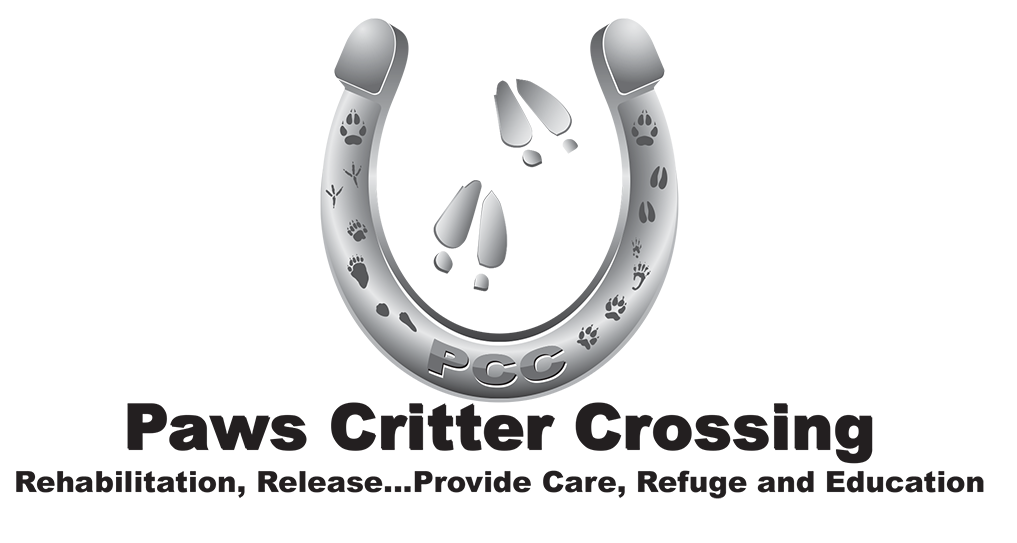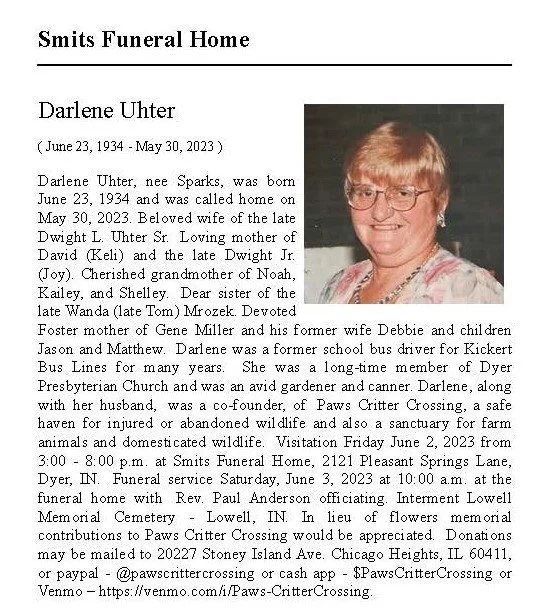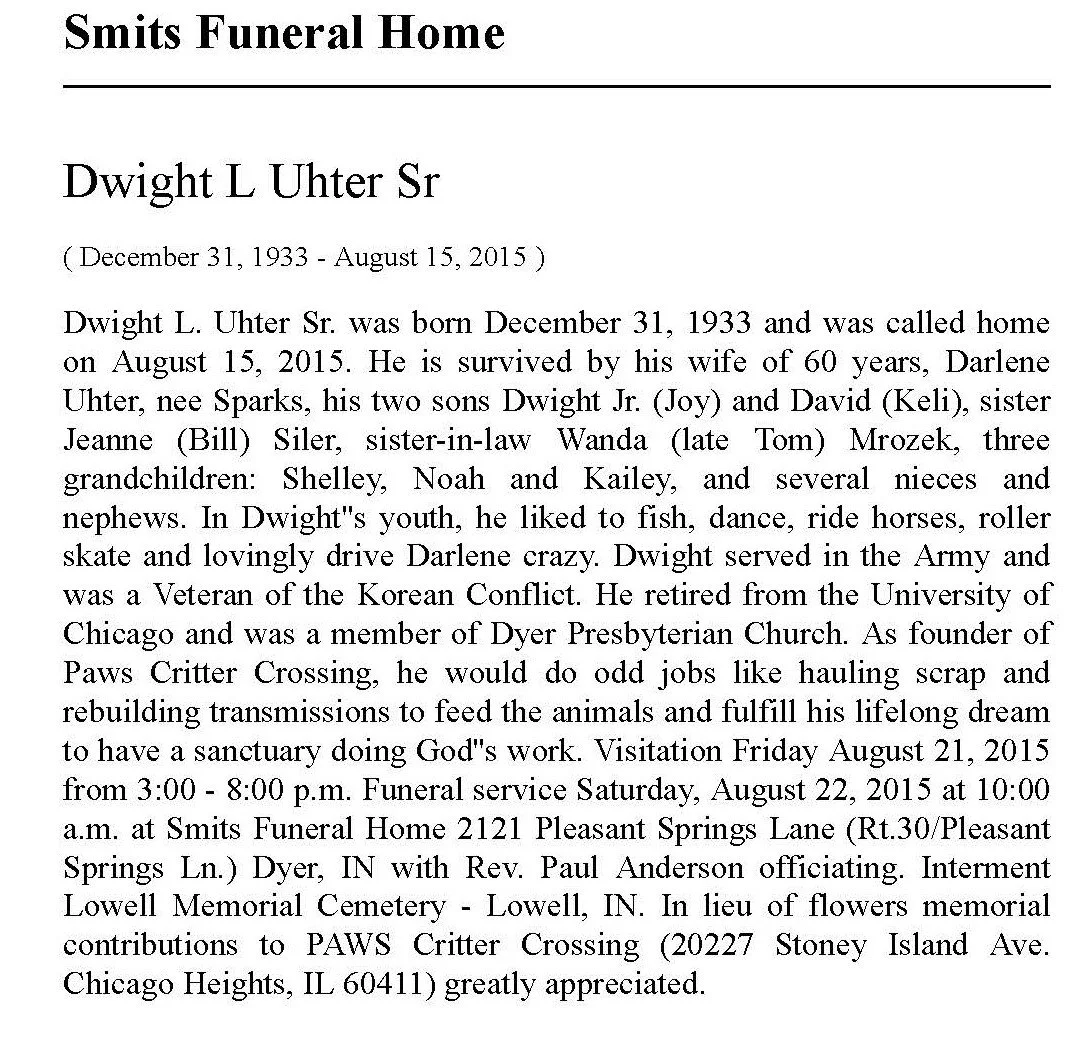Let us answer some common questions for you in this section.
1. When did you first start this organization?
Paws Critter Crossing was started by my Father, Dwight Uhter in the early part of the 1980’s. PCC was incorporated in 1999. In 2004 Dwight became the CEO and I was appointed President and I handle 90% of the behind the scenes work.
2. What type of animals do you care for or take in?
Paws Critter Crossing is a two part organization. One part deals with the rehabilitation of wildlife with the exception of birds and endangered animals. All Wildlife is returned to the wild when the animal can survive on its own. The second part of Paws Critter Crossing cares for its permanent residence that consist of animals that were unwanted or neglected by agencies/people and indigenous and non-indigenous wild animals that have been captive breed. Most of the animals that come to us will live out the rest of their lives under our care.
3. What are the restrictions about the animals that you take into care?
PCC has several restrictions about the animals we taken in. a. We don’t have the licenses for birds and or endangered animals so we can not take them in. b. We do make referrals from time to time, due to our limited amount of space and pasture area; we can’t take in many large animals. c. We only work with indigenous and non-indigenous wild animals; therefore we are unable to accept cats or dogs.
4. What is your facility like?
PCC is not a fancy place, but its home to a lot of critters, we squeeze everything into our 3 little acres in Unincorporated Cook County. All or most of the material we use to make our cages is slightly used material unless we are able to purchase new ones with money generated from our fundraisers. We are not funded by the government; therefore the only money we receive is from private donations. We have received a few small grants from Corporations, and we also get commodities donated from businesses.
5. What activities or entertainment do the animals get on a daily basis?
Most of our animals are turned out to a large fenced in pasture where they can run around or graze on the green grass. The smaller animals that are limited to cages are given toys to play with. Some of our trained volunteers go into the cages to play with the animals, and provide loving care.
6. How many animals do you have right now as permanent residents?
PCC has roughly 50 to75 permanent residents at this time.
7. How are you able to keep track of all of those animals?
We keep a file on all of our animals. They each have their own file that has to be kept up to date for the State and Federal officials to view at any time.
8. Why did you start this organization? What made you start it?
Dwight Uhter started it many years ago. He bought a baby fallow deer for one of his grandkids as a pet, but the deer got sick and he had to take it to our local vet who reported him for having the animal. The Illinois Department of Natural Resources (IDNR) came out with in the week and was going to destroy the deer because they were told it was a whitetail deer and it is illegal to own a whitetail deer in Illinois with out purchasing a license. When IDNR arrived they found out that it was a fallow deer and they told him how to get his license. So he did and then things snowballed from that point.
The reason we started PCC was to help the animals that were hurt, abandoned or neglected as well as the love and compassion we have for them. As my father says “We can’t survive in a world with out them and if we didn’t help them who would”.
9. How does your facility and organization measure up to others?
There are other facilities and organizations that come close to what we do that are federally funded and much larger than we are, so we can’t compete with them. As for the size we are, there are not too many organizations that handle all the various indigenous and non-indigenous wildlife that we do, so in that respect, we rank with the best of them. We handle a large volume of animals each year on a limited space, so I guess you could say that we are one of the largest non-funded organization around that handles what we do.
10. Did your organization grow relatively quickly, or did you have to wait to get to the point where it's at now?
PCC started out very small in fact when we first started it was my father, myself and three other people. We have now expanded to a great board of seven people with roughly 50 wonderful volunteers. It has taken us a long time to get where we are now.
11. What is a typical day like for you and the others working at Paws Critter Crossing?
For my self the days are long and filled to the max with things that need to be done. For example, on Monday I leave my house at 6:50am so I can be to work in Chicago by 8:00am then I return home at 5:45 grab a quick dinner then off to school and after school ends at 9:00pm I return to PCC to let in the animals for the night and if necessary give medical treatment to any animal that needs it. Some nights I work on paperwork or do small repairs to pens or cages. I usually get to bed about 11pm. It is not uncommon to go to bed after 12:30pm some nights. Now on top of all this, I have a five year old son and my wife to spend time with also. Many of volunteers will come out after work and help with what ever needs to be done and many nights they don’t leave until 10pm. Taking care of God’s creatures is a full time job 7 days a week.
12. How many animals would you say your organization helps each year?
Last year we helped roughly 400 animals and this year we will probably do more.
13. Do you have volunteers? How would someone be able to get involved with working or volunteering for your organization?
We have a great group of volunteers. During the spring and summer we have upwards to 60-70 volunteers when the babies start coming in. Everyone at PCC is a volunteer, no one is paid. Our vet volunteers her time as well. The only thing we pay for are the medicines used to treat an animal. I would like to add that with out a dedicated group of volunteers no organization will do very well. The volunteers are the backbone of any organization.
If someone would like to volunteer we ask that you stop out and visit with us first and see what it is we do. Also, due to our insurance we ask that you be at least 14 years old or older to handle any of the animals. Then, if it seems like something they want to get involved in, then we find out where your talents would be best used and put them to work.
14. Do you sell any animals, or do you keep them all?
No, we do not sell any of our animals. Although, being a two fold operation, the wildlife animals that we rehabilitate must be returned to the wild as soon as they are able to make it on their own. As for the other indigenous and non-indigenous wildlife animals that we take in, we will trade an animal from time to time if that animal becomes too aggressive. We want to ensure that the public and our volunteers are safe from injury at all times. We also adopt out small animals like ferrets and rabbits to good homes because we get quite a few of them at one time and we don’t have enough room to house them all. Plus, we have no place to keep them during the extreme heat in the summer the extreme cold in the winter.
15. How would someone come into contact with Paws Critter Crossing to learn more about your organization?
Call us at 708-710-3167. To really learn about PCC you can stop out and visit and see what goes on first hand.




